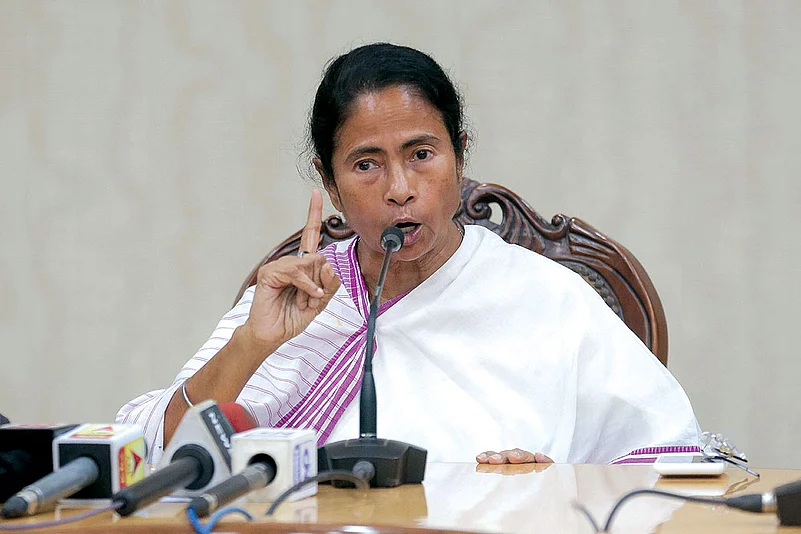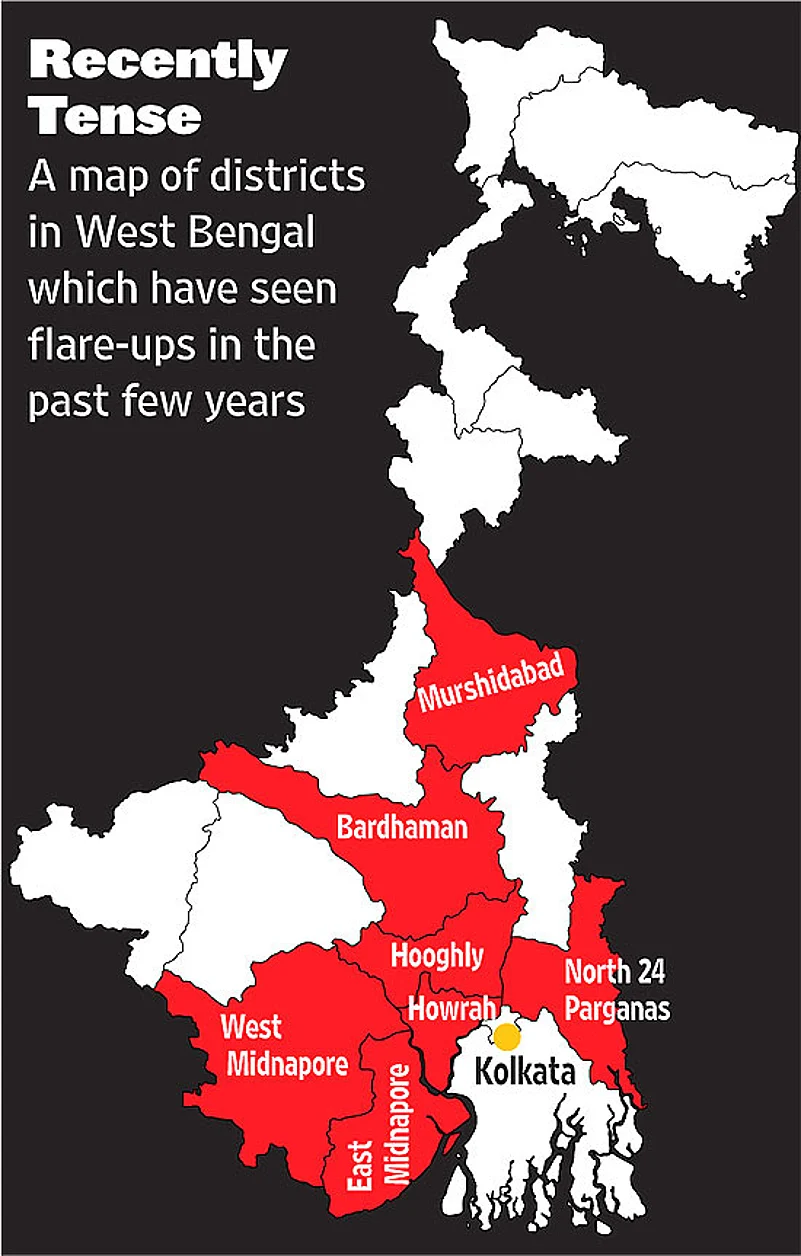Assembly elections are three years away, but the air of polarisation in West Bengal would suit a pre-poll scenario. And the phrase ‘President’s rule’ is beginning to be uttered. A year after the Malda riots, the state is in the grip of violence again—this time over a Facebook post by a class 11 student, deemed derogatory to the sentiments of the Muslim community. As incidents of rioting continued to be reported from towns in North 24 Parganas district, CM Mamata Banerjee made an impassioned plea to both communities to help keep peace. Critics were not satisfied, though.
Observers point out this is the first time in the six years since she came to power in 2011 that Mamata has had to make such an appeal. During a press meet at the secretariat on July 4, she said, “I want to tell both communities and their leaders, I have had to suffer a lot of humiliation because of you. I am not going to tolerate this hooliganism.” Though addressed to both sides, one in particular seemed the intended recipient. Recent politics offers clues, with Mamata’s overt wooing of the Muslim community being matched by an aggressive Hindutva pitch by the BJP in an increasingly bipolar field.
The riots continued even after the boy, who posted the meme on Facebook, was arrested by the police. “What more could I do,” Mamata seemed to be asking rhetorically. The question seemed directly addressed to the rioters who had been baying for the blood of the boy, even though he is behind bars. This has led the CM’s critics to ask why she needs to defend herself before the rioters. “The question should be asked to the people of Bengal,” says BJP leader Chandra Kumar Bose in an interview to Outlook. “And the answer is, ‘a hell of a lot more’. To begin with, she should be arresting the criminal elements within the particular community rather than trying to appease them.”
According to unconfirmed reports, mobs brandishing knives and swords circled police lock-ups, demanding that the boy be handed over to them. Mobs also burnt police vehicles and vandalised property belonging to the other community. BJP general secretary Kailash Vijayvargiya, in-charge of the state, claimed in a letter to Union home minister Rajnath Singh that “more than 2,000 Muslims attacked Hindu families”. And although no such report has come up in the local media, Vijayvargiya went on to claim that “there was information of Hindu sisters and daughters being raped.”
In fact, the BJP has called for President’s rule to be imposed in the state. The Left has, perhaps expectedly, not endorsed this demand, with CPI(M)’s Biman Bose outright rejecting the idea. “The situation is not so grave as to demand President’s rule,” he said. The state and central Congress leaderships, though, are equivocating, with the Bengal Congress’s Om Prakash Mishra finding it fit to call the current atmosphere a complete breakdown of law and order.
Beset on all sides, an irate Mamata finally decided to address the issue at the above-mentioned press conference at the secretariat. During the meet, she also stated, without revealing the details of the conversation, that she had received a call privately on her cell phone from the Bengal governor Keshari Nath Tripathi and claimed to have felt “insulted” by him. While the governor issued a denial, stating that he had merely expressed his concern over the graveness of the situation, as was his duty as the constitutional head of the state, the face-off between the two, according a section of political experts, is diffusing attention from the seriousness of the riot.

In Bengal, the Muslim vote—currently 35 per cent—has long been the stereotyped object of desire for political parties. The Left Front is known to have cultivated the community during its long rule, but they switched loyalties to the TMC in the aftermath of the agitation in Singur, where many of them were affected by the land acquisition. Thereafter, Mamata’s near-exhibitionistic avowal of symbolic ‘Muslim’ issues has been getting matched by an ever-more vociferous saffron pitch by the BJP, with organisations like the Hindu Sanhiti forming the vanguard.
A polarising situation like this, therefore, is almost tailor-made for both sides—though Mamata has more to lose. “The riot is an indication that the politics of appeasement has now backfired,” says Bose. “In the process of keeping a community happy, if the administration takes a tolerant stance towards criminal elements within that community and refuses to take action, letting its police be mute spectators and turn a blind eye to crime if it is committed by a sections of that community, this is bound to happen. Ever since the CM came to power in 2011, she has not just been unduly tolerant of misdeeds conducted by criminal elements within this community but has gone to the extent of making them feel as though they could get away with murder. So now the time has come for her to handle her own situation,” alleges Bose.
Although Mamata has said that she considers the current rioting a gravely “serious situation” and that she would “handle it seriously”, her critics call it mere posturing, pointing out that the CM is never shy of taking a ‘tough stance’ in situations that do not involve communal or votebank considerations such as the recent Gorkhaland agitation in Darjeeling. When the Gorkhas, angered by the imposition of Bengali, reiterated their old demand for a separate state, Didi was prompt to crush it. Not only did she have police deployed, she asked for additional paramilitary reinforcements from the Centre. That same aggression and sense of initiative is missing in the current situation, Mamata’s critics point out.
The two issues are related in another, tangential way. In fact, the imposition of Bengali in the schools of the region was seen as a move by Mamata to create a counter-mobilisation in the plains so as to negate the advance perceived to be made by the BJP. Language is an emotive issue that cuts across communities in Bengal—recall that Bangladesh broke off from Pakistan partly on this—and it was seen as an effective bulwark against a new religious pitch that seeks to unite the 65 per cent ‘Hindu vote’.

Pushed back to the wall, the Trinamool is now resorting to a counter-attack. “Religious violence and communal riots are new to Bengal, it has so far been a truly secular state,” says a TMC MLA. “This violence is being incited and fanned by the BJP, which is trying to make an entry into the state. It’s trying to disturb the communal harmony of Bengal by dividing up the two communities.”
Not everyone is so sure. “How long can you hide it?” asks a resident of Entally, a congested central Calcutta locale, where Hindu and Muslim families live in equal numbers. Speaking to Outlook without revealing her identity, as a Hindu-Muslim riot rages less than fifty kilometres away in the town of Baduria, the fashion designer talks about an incident in her area from about four years ago—when tension prevailed between the two communities. “I don’t even know what the trigger was. What I remember clearly is how we were told by police to keep hush about the incident and not talk to the media. Peace did return a few days later but it has remained a puzzle to me.”
Chandra Bose, earlier a Left politician who joined the BJP recently, would claim this as an instance of “appeasement”. “Hindu-Muslim riots, contrary to what state governments have tried to project over the years, are a reality in Bengal. The attempt to hide it is a part of the appeasement policy.” Nothing, however, is hidden about the mutually beneficial nature of polarisation in India.
By Dola Mitra in Calcutta


























